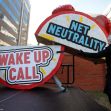The Justice Department dropped its legal challenge of California’s net neutrality law in the Eastern District Court of California on Monday. This move could represent a shift back to the Obama-era policy of equal access to the internet.
The FCC’s interim leader Jessica Rosenworcel said, “When the FCC, over my objection, rolled back its net-neutrality policies, states like California sought to fill the void with their own laws. By taking this step, Washington is listening to the American people, who overwhelmingly support an open internet, and is charting a course to once again make net neutrality the law of the land.” Dropping the challenge suggests that the FCC will take a tougher approach toward internet provider companies.
What is net neutrality?
Net-neutrality rules are intended to stop internet providers, especially cable and phone companies, from benefitting some internet content more than others, such as by applying higher speeds to preferred content.
Public opinion polls demonstrate consistently that the overwhelming majority of people in the U.S. - Democrats and Republicans alike - support net neutrality.
California is not the only state seeking to enact laws governing an open internet. Washington state has already done it, and others are considering it.
Net neutrality history
The 2015 Obama-era rules, rolled back under Trump in 2017 with telecommunications industry support, treated carriers like utilities. This approach could be a platform from which to address broadband affordability issues that could be managed by eventual rate regulation.
Telecom companies complained that the Obama-era rules would impair broadband investment. The Trump FCC rejected the Obama rules and put in new rules that required providers to reveal practices that prioritize or disfavor certain content.
Not only did the Trump administration combat net neutrality, but it also deregulated most of the industry. Under Ajit Pai, former FCC chair, the agency was criticized for being friendly to the companies and not helping improve American citizens’ ability to access the internet or higher internet speeds.
The U.S. recently dropped out of the top 10 countries for global internet speeds, reports DecisionData.org, and Americans still pay much more for the service. Industry arguments that deregulation promotes innovation and cost savings for customers seem disingenuous in light of these findings.
In response to the Trump FCC’s rules, California passed its own net neutrality law. California’s statute forbade internet service providers from intentionally slowing a website or app, blocking websites, or accepting payments to make online services go faster. These rules closely resemble, but are more strict than, the Obama FCC rules.
In addition to the elements of the Obama-era rules, California outlawed “zero-rating offers,” which allow carriers to exempt certain services from being applied to the end user's use cap. Further, the net neutrality rules would be applied to “interconnection deals” between network operators, which was not explicitly a part of the Obama-era rules.
Interconnection is when two networks “hand-off” traffic to each other. This would happen if, for example, Netflix delivered video streams directly to Verizon or AT&T broadband providers, who control the internet connection into people’s homes. These handoffs are negotiated and contracted privately.
The Justice Department challenged California’s law, arguing that the states do not have the authority to regulate the internet. They said that responsibility belongs to the Federal government. They were joined in the challenge by internet providers, including AT&T, Verizon, Comcast, and Charter Communications. Their hearing was scheduled for February 23.
Last month, Rep. Anna Eshoo (D-CA) and a group of her colleagues wrote a letter to Merrick Garland, Biden’s choice for attorney general. The letter urged Garland to dismiss the case.
Going forward
If the Biden administration reverts to the 2015 FCC rules of the Obama era, they will be re-establishing the FCC’s oversight of broadband. The agency would have authority to police abuses, such as fraudulent billing or weak privacy practices. The agency would also have more authority to promote competition by pre-empting state laws that prevent municipalities from offering broadband services.
“The debate has always been about the FCC’s authority. The question is really about whether there should be an agency to oversee the broadband market,” said Gigi Sohn, a fellow at the Georgetown Law Institute for Technology Law & Policy. She is also an adviser to former FCC Chairman Tom Wheeler. “I’m not advocating for just reinstating the old rules,” Sohn said. “We need to push for FCC authority to adopt policy to handle issues like zero-rating and data caps.”
Other parties suing California in federal court over the law are the wireless industry’s lobby group, CTIA; the lobbying organizations for the cable industry, NCTA and the American Cable Association; and USTelecom. These groups claim that California’s net-neutrality rules are illegal.
The Biden administration’s path forward on this topic is uncertain. The FCC is deadlocked along party lines right now, making it unlikely that any net neutrality rules could be passed in the short-term. The deadlock drops the possible next steps into Congress’ lap, at least until the Senate can confirm a Democratic commissioner.






